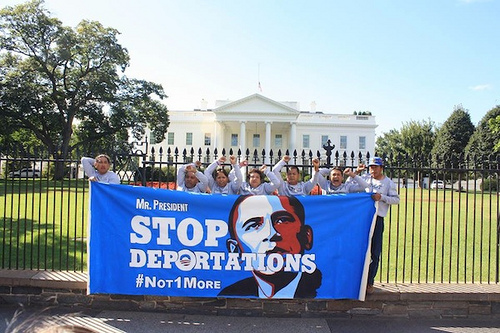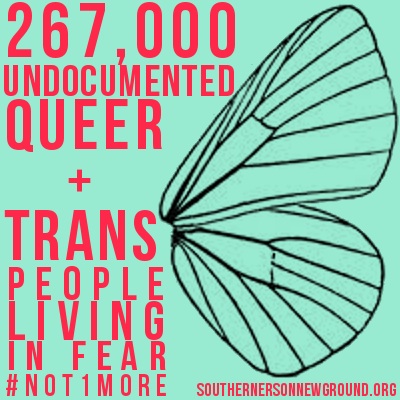“Our immigration system is broken, and everybody knows it,” said President Obama, when he made a speech on Thursday, November 20th announcing he would take executive action to remove the immediate danger of deportation for millions of people living undocumented in the United States. This plan has been long-promised, and after multiple delays, it’s finally here.
Is the President’s plan enough? As long as there are people whose lives and families are in the US remain vulnerable to deportation, is not enough, but it is something, and it is the result of the hard work of thousands of activists who have put everything on the line to make their presence known as undocumented and immigrant Americans who deserve rights and dignity.
The President’s action has created “administrative relief” for two specific groups:
1. Parents of US citizens or lawful permanent residents on the date of Executive Action (November 20, 2014) who have continuously resided in the US since January 1, 2010
2. Any individual who arrived in the US before the age of sixteen AND before January 1, 2010, no matter how old they are now
The President’s plan will potentially expand protections from deportations for four to five million people. It widens the umbrella of people covered by Deferred Action for Childhood Arrivals (DACA), which came by executive action in 2012, because it eliminates the age cap that only made DACA available to people who were under 31 in 2012. It also means that undocumented parents of kids who are citizens or have legal residency can take measures to not be deported. This is a measure that, had it been available, would have likely provided protection for people like the parents of Diane Guerrero, the actress who plays Maritza on Orange is the New Black, who shared her story of her parents being deported when she was fourteen.

#Not1More activists handcuff themselves to the White House in 2013 to demand an end to deportations. via #Not1More
However, the executive action does NOT incorporate the parents of undocumented kids who are eligible for protection because they arrived before the age of sixteen, which will still leave millions of families at risk for separation. Administrative relief also only applies to legal family, and while the announcement doesn’t necessarily specify, that likely doesn’t incorporate unrelated parental figures or chosen families, which means that queer families and people with non-traditional family structures will undoubtedly find themselves excluded and left increasingly vulnerable to the dangers of detention and deportation.
The President also noted that all protections granted under his executive action are only for people who have lived in the United States for the past five years and who pass a criminal background check. Recent border crossers, who have entered the United States since the beginning of 2014, will not be eligible for protected status and their deportation will have increased priority after the action. This will come as part of a new Priority Enforcement Program, which will replace the Secure Communities program. PEP will pare down the extent to which local law enforcement collaborates with immigration enforcement, but it will also “build on our progress at the Border” by allocating more resources to border enforcement and deportation procedures.
However, he made no mention of shifting or changing inhumane conditions in detention centers or the lack of access to legal representation or resources for people in deportation proceedings, despite calls from various organizations. Isa Noyola and Olga Tomchin from the Transgender Law Center were among those who called for the President to act on conditions for detained immigrants, noting that as the President made his announcement of executive action on Transgender Day of Remembrance, transgender immigrants face abuse and assault in detention centers.

The action also does not create a pathway to citizenship, as the President made quite clear:
“it does not grant citizenship, or the right to stay here permanently, or offer the same benefits that citizens receive — only Congress can do that. All we’re saying is we’re not going to deport you.”
People hoping to apply for administrative relief after the President’s announcement should take note of several things: applications will not be accepted until January 2015, which means that those hoping to apply can begin to gather documents to establish their eligibility now; in particular, proof that they have been in the US for five years. In a statement leaked from White House sources before the President’s speech, the White House warned that people who commit fraud or omit necessary information from their applications will not qualify and will also possibly be subject to deportation proceedings. Finally, applicants are advised to be wary of scams. United We Dream has information and resources for people hoping to apply, and Stop Notario Fraud has information on how to avoid scams or exploitation from lawyers and other people claiming to offer help or support.
This announcement has been a long time coming. The fight for the DREAM Act or other legislative immigration reforms have all stalled in Congress. The President promised executive action before the midterm elections, and then he went back on his word, but finally, he has delivered something. It isn’t as powerful as legislation could be, and the President pushed hard at Congress to take further action. Still, the significance of this achievement shouldn’t be understated. It’s come about thanks to communities and activists fighting to make deportations a national issue. Many undocumented people have outed themselves in the process, making themselves vulnerable to deportation and separation from their families and communities.
At the same time, this announcement is inadequate for seven million people who will still fear deportation after administrative relief goes into affect, and it potentially makes things worse for people who very recently arrived in the US. As the President said, “If you plan to enter the U.S. illegally, your chances of getting caught and sent back just went up.”
The President painted a picture of a “good immigrant” and a “bad immigrant”: “Felons, not families. Criminals, not children. Gang members, not a mother who’s working hard to provide for her kids.” Those who “play by the rules” and those who don’t. But what the President really did in this speech is create an arbitrary line. A good immigrant/bad immigrant binary. Did you get here before January 1, 2010? Or did you arrive on the second? Were you sixteen? Or seventeen and a day? Were your children born here? Or did you carry them here in your arms two weeks after you gave birth? The President pointed to Astrid Silva, who was brought here at the age of four by her parents, and who has become an outspoken undocumented activist. He said the US should welcome her, a “striving, hopeful immigrant.” But, as Aura Bogado pointed out on Twitter, President Obama failed to note that her parents who brought her will not be eligible for protection under the action.
See, this is what I mean. Astrid Silva is eligible. What about her father? He goes missing in Obama's #ImmigrationAction.
— Aura Bogado (@aurabogado) November 21, 2014
Were her parents not “striving and hopeful” enough when they brought their daughter here?
What is certain is that while some will sleep easier tonight, the fight to end deportation and the fracturing of communities and families is far from over. Today, November 21, people are rallying across the country. Find out where you can join in.

I’m proud of Obama and his actions on immigration. As a child of undocumented parents, this will really help every one of our families
It’s a start but, seriously,this should have been done years ago. It’s like the dems didn’t learn anything from the 2010 election…
thanks for the informative piece. I was hesitant to listen to his speech. My family has not had a very good relationship with the INS to say the least.
Currently, or I should say, for the past over 10 years now, my mother has tried to get her husband a green card (she is a citizen). But because he was caught crossing the border illegally so many years ago he doesn’t qualify. Immigration’s solution? Sending him back to Mexico for 10 years and then trying again. I don’t understand how this makes sense to anyone. People risk their lives crossing over for a damn reason. I’m looking forward to discussing this with my mother. Hopefully, somehow this helps their case.